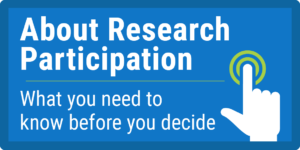Research Affects You
There are many reasons to participate in research. Perhaps you or a loved one suffers from a condition without an established cure. Maybe you want to contribute your opinion or experiences on a topic that interests you. Nearly all of the medicines, therapies and devices we rely on every day were designed and refined through trials involving human research subjects.
Clinical Research Glossary
This glossary is a list of research words and their meanings provided by the Multi-Regional Clinical Trials Center (MRCT Center) of Brigham and Women’s Hospital and Harvard. Use this glossary to learn more about words that are used in research studies.
Research/Clinical Trial at USC
- Clinical Trials at USC
- Cancer Center Trials at USC
- Psychology Subject Pool (Students only)
- Dept of Marketing Subject Pool (Students only)
Clinical Trial Search Tools
- How to Find a Clinical Trial
- ClinicalTrials.gov
- Research Match
- NIH Clinical Trial Registries
- Trial Match (Alzheimer’s Association)
- Fox Trial Finder (Parkinson’s Disease)
Research Participant Guidance
- Glossary of Clinical Trial Terms
- Education Before Participation
- NIH Resources for Participants
- “Becoming a Research Volunteer: It’s Your Decision” (Pamphlet)
- Veterans’ Participation in Research
- Research Volunteer Informational Videos (OHRP)
Kids in Research
- Children & Clinical Studies (NIH)
- Should Your Child Be in a Clinical Trial? (FDA)
- FDA for Kids
- “What is Medical Research” — Comic for kids
Public Health & Research News
- Report Adverse Events (FDA)
- Easy to Read Health & Safety Info (NIH)
- Agency for Healthcare Research and Quality (HHS)
- News about Clinical Trials (AHRP)
- The Center for Information and Study on Clinical Research Participation
- USC Community Involvement
Questions to Consider Before Deciding to Participate in Research
Does the study demand a large time commitments or expenses?
Such as commuting to and from appointments.
Are there potential risks or side effects?
The research team must inform you of any risks or side affects before you decide to participate in the study. This is part of the informed consent process
Are there benefits?
Many research studies involve control groups or placebos. If you are in such a group you will not receive the experimental treatment, however, you will be fulfilling an important role by helping researchers measure the effectiveness of the experimental procedure, drug, or device.
Who is conducting the study?
The Principal Investigator (PI) may be a physician, educator, student, or member of non-profit or for-profit organizations. You may be interested in finding out what company or institution is funding the study.
Who has reviewed/approved this study?
At most colleges, hospitals, and other institutions that receive government funding, studies involving human subjects are reviewed by a board of physicians, scientists, community members, students who assess the safety of the study and ensure that the subjects rights are appropriately protected according to federal law.
How will my privacy be protected? Who will have access to my records?
Ask the study coordinator or a member of the research team about how they plan to store your information and how long they plan to keep it. Will your identity be kept anonymous or do they wish to record “personally identifiable information” such as your address, phone number, social security number, etc..?
What if I no longer want to participate?
No one can force you to participate in research or to continue if you wish to withdraw your participation. A member of the research team should make that clear to you when you agree to participate.
Complaints, Concerns, or Reports of Violations
File or inquire about a human subjects related complaint, concern, or reports of violations.


